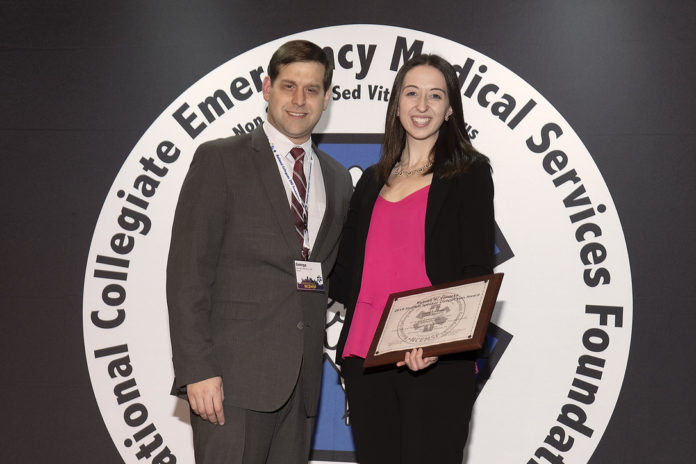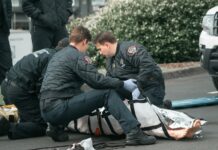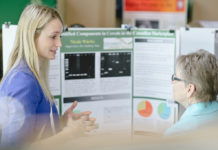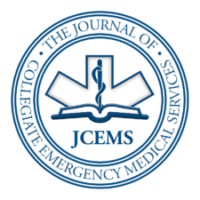Catherine Gibbs was honored as the winner of The Richard W. Vomacka Student Speaker Competition at the 26th Annual Conference of the National Collegiate EMS Foundation (NCEMFS) in Pittsburgh, PA. The Vomacka Competition – named for an NCEMSF mentor who passed away in 2001 – was introduced in 2002 and offers students an opportunity to showcase their presentation skills with high quality educational seminars. Ms. Gibbs delivered a well-researched, inspiring presentation on the role of EMS in community and youth engagement. Ms. Gibbs graduated in 2019 with a B.S. in Neuroscience from Temple University (Philadelphia, PA), where she served as the Director of Operations for Temple EMS. She is currently continuing her education at Thomas Jefferson University (Philadelphia, PA) and aspires to pursue a career as a Prehospital Registered Nurse.
You’ve been involved in EMS since an early age. Where did your EMS career begin?
I started my EMS career at age twelve by enrolling in my local ambulance company’s summer camp. I continued by joining the company’s Explorer Post program, designed for adolescents interested in emergency service or medical careers. Through this program, I was able to run on the ambulance and obtain certifications such as Emergency Medical Responder and Emergency Medical Technician. I continued my EMS education and became one of the youngest Advanced Emergency Medical Technicians and EMS Instructors in Pennsylvania. I was also very engaged with the community and designed and coordinated many programs and fundraisers. I became a community course instructor and founded our company’s Teddy Bear Hospital and Pre-Junior Medic Camp. Both programs are designed to engage children at an early age and promote the importance of safety and basic emergency preparedness and management.
How did your early love of EMS help you serve in a leadership role in collegiate EMS?
When I was applying to college, one of the top criteria was a collegiate EMS program with opportunities to teach. Temple University was fairly close to home, and I fell in love with their EMS program….oh, and the school too! After I began school, I joined Temple University’s EMS program and eventually became the Director of Operations. Temple EMS offered a wonderful community and there were opportunities for the organization to grow. It was incredibly important to me to engage my new community in emergency preparedness, so I designed a tiered education program to engage school-aged children in emergency management and preparedness. The program, Basic Education of Aid and Rescue (BEAR), introduced more complex first-aid/CPR concepts as the students aged.
Since graduating from Temple, have you remained active in EMS?
I continue to work with Temple University, as an EMS Liaison, where I am working to develop an on- campus EMT program. I also continue to work with my original EMS company as an EMS educator and I work with Chester County Department of Emergency Services as an NREMT Exam Evaluator. Most recently, in addition to continuing my education at Thomas Jefferson, I’ve also begun to work as an EMT contractor for the Children’s Hospital of Philadelphia Emergency Transport Team.
You won the Vomacka Student Speaker Competition for your presentation on community and youth engagement. Why was this an important topic to you?
Emergencies are unpredictable and can occur at any moment. Over 240 million 9-1-1 calls are made in the United States each year. The national average for an emergency response is approximately fifteen minutes. The overwhelming majority of community members are ill-prepared when an emergency arises. When it comes to saving lives, every second counts and a prepared bystander often make the difference between life and death. I think it is essential for all EMS organizations to engage with their communities, and especially youth, in order to teach lifesaving techniques and emergency prevention After attending college in an under-served part of Philadelphia, I gained an immense appreciation for the impact that even a small outreach program can have. My presentation for the Vomacka Student Speaker Competition was designed to help collegiate EMS organizations start community engagement programs and find ways to captivate their target audience. Based on my experience, I discussed how to target education based on individual learning styles, how to develop youth education programming, and how to promote long-term program success. As EMS providers, it’s critical that we train bystanders to help prevent emergencies before they occur and to be prepared when they do.
What advice do you have for collegiate EMS organizations that want to get involved in community and youth engagement?
Every program can be successful. At the end of the day, it all comes down to the effort you put in. A great program will take time and effort. A lot of it. It is not always easy, but if you are passionate, giving up is never an option. And remember, keep revising to improve your program and help reach more people. Keep in mind, finding engagement tools does not have to be an expensive, extravagant endeavor. For example, my dad and I built a wooden ambulance out of supplies from a local hardware store to create an engaging toy for children.
“A great program should take time and effort…
If you are are passionate, giving up is never an
option…do not be afraid to ask for support!”
Do not be afraid to ask for support! Partnering with NCEMSF is a great way to connect with other collegiate organizations, but you can also connect with local departments. In regards to funding, sit down with your student government to request additional funding. Make sure you have a detailed proposal/outline prepared for the project. Do not be afraid to reach out to local companies and organizations; just make sure you have a professional letter drafted. Request to meet with your university’s philanthropy department or apply for grant funding. Most importantly, remember you will make a difference. Getting through to one person can have an immense impact.
Any advice for students who are thinking about giving a presentation at the Vomacka Competition?
Presenting at the 2019 Vomacka Competition last year was an immense honor and an absolute pleasure. I really enjoyed meeting the other speakers and hearing about their presentations. Their passion was evident and radiated through their conversation.
“Pick a topic you are passionate about.
You’re presentation should inspire your audience –
they should feel your enthusiasm!”
My advice to anyone considering submitting a presentation is to make sure you pick a topic you are passionate about. Your presentation should inspire your audience and they should feel your enthusiasm!








